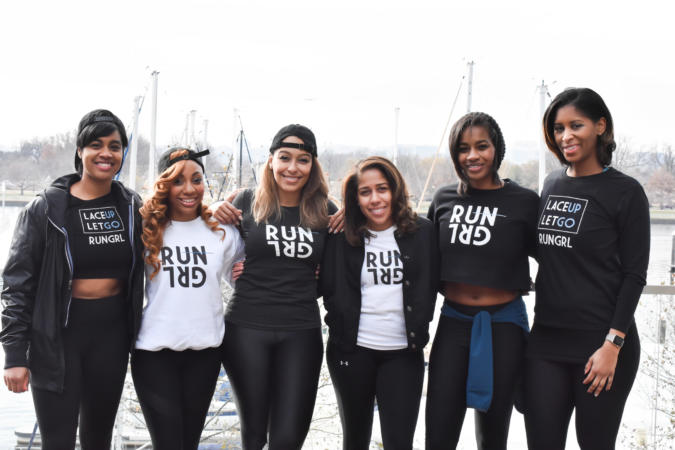This story originally published on October 8, 2018
The founders of RUNGRL Co. are going the extra mile to bring Black women runners together through a new collective that’s changing the narrative around what it means to be a long distance runner.
RUNGRL Co., a digital platform its founders describe as “fearlessly female and unapologetically Black,” was designed to inspire and be a resource for Black women distance runners and promote diversity within the running community.
“We are all runners. In our adult lives, we found running to be great for fitness and community,” said co-founder and CEO Ashlee Lawson. “But, we didn’t see ourselves represented in the space. So we decided that we would create that space for ourselves.”
Created in 2017 by a group of friends in Washington D.C. after noticing the running community lacked a safe space for Black women runners, founders Jasmine Nesi, Ashlee Lawson, Dominique Burton, Stephani Franklin, Na’Tasha Jones, and Natalie Robinson set out to build the platform to change the narrative around what it means to be a runner.
“We needed stories of the everyday black woman running,” Lawson said.
All six co-founders work full-time using every other waking moment devoted to building their business into an online (and sometimes offline) destination for Black women to find inspiration and information about health and wellness.
RunGrl is content driven using their platform to foster conversations including health, nutrition, fitness gear, hair, and self-care.
“It’s important that we inspire women who aren’t at the level of competitive athletes,” explained Chief Content Officer, Na’Tasha Jones. “We wanted to show that it could be done.”
The company kicked-off earlier this year with a 12-week half marathon training campaign capturing the journey of 12 individual runners as a way to begin creating and curating content for the digital venture.
“For the people who are already running, we want them to be seen and want them to be heard,” said Jasmine Nesi, co-founder, and COO.
Nesi notes that hair is often a struggle for some Black women runners who face challenges figuring out how to style hair during workouts or while running. According to a 2013 survey by Wake Forest University School of Medicine, 40 percent of Black women avoid exercise due to hair-related issues, and 50 percent have had to alter their hairstyle to exercise.
“We knew that hair was a barrier overall. We created a community of other women who look like you” Nesi said.
The team launched the #MyRunningHair campaign to promote health and wellness with the goal of encouraging Black to women to get active despite hair roadblocks.
“Given the statistics, we wanted to bring the importance of the [hair] issue out there,” Jones said. “We’re talking about the things that Black women talk about all the time, and the response has been overwhelmingly positive.”
The digital platform helps the founders spread their message far and wide to a diverse audience of engaged runners. Their website features profiles of runners and athletes — including Olympic Gold Medalist Natasha Hastings — who lend their perspectives on hair, beauty, and workouts.
“The great thing about digital is the ability to reach a wider audience,” explained Jones. “Within that, we are reaching people who haven’t quite dipped their toes in the water.”
Though the founders have cultivated an online audience with over 2200 followers on Instagram and a growing Facebook community, the team is dedicated to helping RUNGRL make moves in real life.
RUNGRL brings its digital content to life through in-person programming like #MyRunningHair events and Miles + Mimosas. These offline events, the founders stress, are needed.
“In person connections with the ‘yes girl’ moments are equally as important,” said Lawson. “These events are creating conversation offline and inspiring people to keep moving.”
In their first year, the RUNGRL Co. founders are looking to establish themselves as thought leaders and experts in the space of Black female athleticism.
“We are growing the community of the people who are following us, but also brands that know we are a resource.”
As the platform grows, the founders see RUNGRL Co. as an opportunity to help brands better understand how to connect with Black women and impact health outcomes in the community.
“We’re here to show brands the way black women consume their products,” said Jones. “We understand the community and we understand our challenges.”
“FUBU is truly how we feel,” Lawson added. “We know what we need and we know what our community needs. There are no better people to do it than us.”

